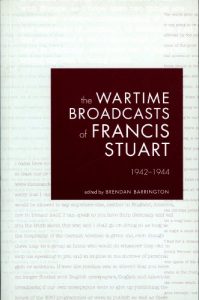It has taken Brendan Barrington's superbly scholarly edition of Stuart's broadcasts to show us how such crucial moral and cultural debates ought to be conducted: calmly, rigorously and on the basis of real evidence. If Stuart comes badly out of this fascinating book, the polemicists on either side of the debate that raged around him don't emerge with much credit either. Thanks to Barrington's exemplary scholarship we can now see Stuart's novels as works of European significance: the attempts of a deeply implicated collaborator to cope imaginatively with the burden of guilt.' - FINTAN O'TOOLE, IRISH TIMES 'The material is fascinating, and the masterly long introduction illuminates Stuart's semi-autobiographical novel Black List Section H perhaps more that he would have wanted.' - ROY FOSTER, SUNDAY TRIBUNE In January1940, shortly after the outbreak of the Second World War, the novelist Francis Stuart (1902-2000) moved from County Wicklow to Berlin, where he had accepted a university lecturing position. Stuart remained in he Third Reich for the duration of the war, and between 1942 and 1944 he made over one hundred broadcasts on German radio to Ireland. The German sojourn and the broadcasts have been at the heart of the long-running controversy over Stuart, and yet remarkably little is known about them. Herein are published the complete surviving transcripts of Stuart's broadcasts, which represent between two thirds and three quarters of his total output. While Stuart often referred to himself as a 'neutral' uninterested in making propaganda, the talks were consistent with the broad thrust of German wartime propaganda to Ireland, and took an often fiercely anti-Allied line. Stuart spoke repeatedly of the necessity of a united Ireland, and suggested that a German victory could bring this about. He spoke warmly of his admiration for the German people and for Hitler. The editor's extensive introduction shows that Stuart's pre-war political interests and commitments were consistent and often passionately held - from a 1924 essay in wich he compared Ireland's struggle against Britain to Austria's against the Jews, to a 1938 letter to the Irish Times opposing plans to receive refugees fleeing Hitler - and intimately tied up with his creative work. (Stuart more than once stressed to his listeners the continuity between what he had tried to express in his fiction - for example, the pro-brownshirt 'sympathies' of a 1933 novel, Try the Sky - and the message of his broadcasts.) The introduction also gives an account of Start's involvement in collaboration between the IRA and the Germans during the war, and suggests that his achievement as a writer can never be adequately assessed until the nature of the relationship between his novels, his politics and his life is confronted squarely.
This site is safe
You are at a security, SSL-enabled, site. All our eBooks sources are constantly verified.






